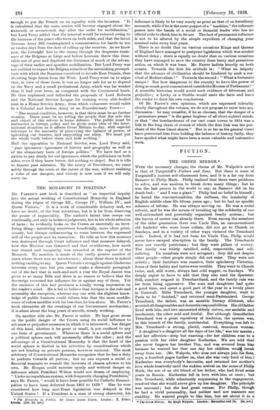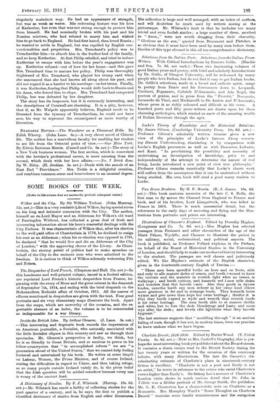FICTION.
THE GREEN MIRROR.*
WITH the necessary changes, the theme of Mr. Walpole's novel is that of Turgenieff's Fathers and Sons. But there is none of Turgenieff's austere self-effacement here, and it is a far cry from Bazarov to Philip Mark. Philip realized that there were problems to solve, and was anxious to break down many things ; but he was the last person in the world to say, as Bazarov did on his death-bed : " and I was a giant." Philip had no belief in himself ; he hated the conventionalities, the stiffness, the insularity of English middle-class life fifteen years ago ; but he had no specific schemes of reform. He was always moving on. He was a social solvent, and he was the means of breaking up the solidarity of one well-entrenched and powerfully organized family system ; but the leaven of unrest was already there. Even among the members of the elder generation there was Uncle Tim, an unconventional old bachelor who wore loose collars, did not go to Church on Sundays, and in a variety of other ways violated the Trenchard code. Indeed, if it had not been for Uncle Tim, Philip would never have escaped absorption in the family. The Trenchards were not exactly patricians ; but they were pillars of society. The family was widely ramified, solid, respectable, and self- sufficing. Its members were not arrogant ; they did not despise other people—other people simply did not exist. They were not artistic ; their furniture was massive, their upholstery Victorian. Some of their habits and tastes were terrible. They went to Churoh twice, and, still worse, always had cold supper, on Sundays. We deeply regret to have to add that they also read the Spectator. Still, comfort reigned in Trenohardland, and the family rule was far from being oppressive. The sons and daughters had quite a good time, and spent a good part of the year in a lovely place in Cornwall. Millie Trenchard, the younger daughter, went to Paris to be " finished," and returned semi-Parisianized. George Trenchard, the father, was an amiable literary dilettante, who avoided all diaagreeables and domestic responsibilities. His old father lived with him, and two unmarried elderly sisters, one amiable and incoherent, the other acid and fretful. But although Grandfather Trenchard was a great repository of tradition, the system was, in this branch of the family, matriarchal. Everything was left to Mrs. Trenchard—a strong, placid, reserved, tenacious woman. " A daughter's a daughter all the days of her life," was her maxim ; and her affection—deep but exacting—for her children rose to a passion with her elder daughter Katherine. We are told that she never forgave her brother Tim, and was severed from him because he warned her that one day her children woula break away from her. (Mr. Walpole, who does not always join his flats, says, a hundred pages further on, that she was very fond of him.) Katherine was everybody's favourite, and returned her mother's love whole-heartedly until the sudden arrival on the scene of Philip Mark, the son of an old friend of her father, who had lived some years in Russia. Katherine fell in love with him at once ; but Mrs. Trenchard, while reluctantly acquiescing in the engagement, resolved that she would never give up her daughter. The principle was unsound ; but she had great excuse. For Philip, though he had a vivid personality, had neither tacit nor manners nor stability. He wanted people to like him, but set about it in a • The Green Mirror. By Hugh Walpole. London Macmillan and Co. lee. net.) singularly maladroit way. He had an appearance of strength, but was as weak ea water. His redeeming feature was his love of Katherine, but -even that was not strong enough to protect him from himself. He had nominally broken with his past and his Russian mistress, who had refused to marry him and wished him to go back to England. He had first hated, then loved Russia ; he wanted to settle in England, but was repelled by English con- ventionalities and proprieties. Mrs. Trenchard's policy was to Trenchardize him—to absorb him in the feather-bed of the family, and so keep Katherine. At first Philip rebelled, and tried to induce Katherine to escape with him before the year's engagement was up. Katherine refused—out of love for her home—and this gave Mrs. Trenchard time to mature her policy. Philip was thoroughly frightened of Mrs. Trenchard, who played her trump card when she announced that she had known all along about his past, and did not regard it as a barrier to his marriage—onher terms. Finally, it was Katherine, fearing that Philip would drift back to Russia and his Anna, who forced him to elope. Mrs. Trenchard had conquered Philip, but was defeated by her daughter.
The story has its longueurs, but it is extremely interesting, and the descriptions of Cornwall are charming. It is a pity, however, that if, as Mr. Walpole apparently believes, England needs to be liberated from the tyranny of Trenchardism, he could not have seen his way to represent the emancipated as more worthy of liberation.



























 Previous page
Previous page